
President Trump is calling on negotiators to “move fast” on Gaza ceasefire talks as delegations from Hamas and Israel convene in Egypt to discuss the 20-point plan announced last week by the White House. The deal calls for Hamas to release all remaining hostages and to disarm. Daniel Levy, president of the U.S./Middle East Project, says it is unclear whether the plan will lead to an end to genocide in Gaza, yet “with all the faults in this plan, and there are multiple, … Biden never pushed this hard,” says Levy.
Transcript
AMY GOODMAN: President Trump is calling on negotiators to “move fast” on Gaza ceasefire talks as delegations from Hamas and Israel convene today in Egypt for indirect talks on the 20-point plan announced last week by the White House. On Truth Social, Trump wrote, quote, “all HELL, like no one has ever seen before, will break out against Hamas,” unquote, if it does not agree to the plan by his deadline. Trump spoke to reporters on the White House lawn Sunday.
PRESIDENT DONALD TRUMP: We don’t need flexibility, because everybody has pretty much agreed to it. But there will always be some changes. But the Hamas plan, I tell you, it’s amazing. You’re going to have peace, if you think about it, peace in the Middle East for the first time in, they say, really, 3,000 years. So I’m very honored to be a big part of that. Look, they’ve been fighting for a plan for years. We get the hostages back almost immediately. Negotiations are going on right now, will probably take a couple of days. And people are very happy about it.
NERMEEN SHAIKH: Gaza ceasefire negotiations on the Hamas side are led by Khalil al-Hayya, who Israel targeted in an assassination attempt in Qatar last month. The deal calls for Hamas to release all remaining hostages and to disarm, and outlines a transitional governance structure. Hamas has agreed to the release of Israeli hostages but hasn’t accepted all the conditions.
For more, we’re joined by Daniel Levy, president of the U.S./Middle East Project and a former Israeli peace negotiator under Prime Ministers Ehud Barak and Yitzhak Rabin. His recent Substack post is titled “Interpreting the Trump (Netanyahu) Gaza plan; reactions to it and what [comes] next.”
Welcome back to Democracy Now!, Daniel Levy. So, if you could give your initial response to Trump’s 20-point peace plan, which indeed you say should not be referred to as a “peace plan”?
DANIEL LEVY: Well, it’s not a peace plan. It’s many things, but not that. Look, the most important component is whether this can bring an end to the Israeli assault, ceasefire, the release of Israelis, the release of Palestinians held in Israel, the Israeli military withdrawal from Gaza, and the entry of massively needed humanitarian assistance, which Israel has been preventing in its starvation policy, and the entry of that on scale. Now, on those things, the 20 points are extremely light on detail, hence the need to flesh those out to make sure that there will actually be a withdrawal, that there will actually be massive ramping up of assistance that’s allowed in. And those are the things that are being discussed now in Cairo, one imagines. The pressure is on to simply — and ridiculously — say, “You know what? Trust America. All those good things will happen.”
The rest of what’s in those 20 points — and, in fact, more of those 20 points — are devoted to the details of some kind of bizarre throwback to the Dutch East India Company, some kind of colonial administration, non-Palestinian, led by Trump, former prime minister here, Tony Blair, and others. My assessment is that they would then try and impose such a model in the West Bank, where you currently have nominal, if deeply unrepresentative and coopted, Palestinian Authority leadership. And there is nothing, other than a few throwaway words, about what would happen eventually in terms of the decolonization, deoccupation of Palestinian land. There is no reference in the whole bloody thing even to the words “West Bank.”
So, the idea that this is going to set aside 3,000 years, or whatever the president wants to call it, is patently absurd. But that’s why, when the leader of the state which is the key enabler of a genocide puts forward a plan, one still has to engage with it. But that is why one at least needs to see: Can it deliver on the immediate, urgent necessity of stopping the killing, starvation and displacement in Gaza, getting Israelis out, getting Palestinians released from Israeli prisons?
AMY GOODMAN: Daniel, I wanted to go to Israeli Prime Minister Benjamin Netanyahu, during a video statement on Saturday, saying that intensified military pressure is the reason why Hamas is forced to agree to the potential ceasefire.
PRIME MINISTER BENJAMIN NETANYAHU: [translated] To bring back our remaining 48 hostages, I instructed the IDF a few weeks ago to enter Hamas’s most important stronghold, Gaza City. At the same time, I coordinated with President Trump and his team a diplomatic move that turned the tables in an instant. Instead of Israel being isolated, Hamas is isolated. And as a result of the intensified military pressure we applied and the diplomatic pressure, Hamas was forced to agree to the plan we brought.
AMY GOODMAN: So, let’s also go to senior Hamas official Mousa Abu Marzook, speaking on Al Jazeera, who said that he did not agree with former British Prime Minister Tony Blair being a governor in Gaza.
MOUSA ABU MARZOOK: We will never accept anyone not Palestinian to control the Palestinian. This is — but this does not belong to Hamas only. This belong all of the Palestinian and the Palestinian Authority and the Palestinian — the PLO. They should say what their response about this. And we can’t bring someone like Tony Blair to be governor in Gaza.
AMY GOODMAN: So, Daniel Levy, if you can respond to both Hamas and to the Israeli Prime Minister Netanyahu? Again, as the Hamas and Israel delegations converge in Egypt, along with Jared Kushner, Trump’s son-in-law, as well as Steve Witkoff, his envoy, describe the whole scene.
DANIEL LEVY: It’s a promising lineup, isn’t it, Amy? So, look, what you have is an attempt by the Israeli prime minister to assert a victory narrative, if indeed he ends up in a ceasefire, which he has resisted for an awfully long time. I think he’s also trying to tee up already the premise for preventing a full withdrawal and for resuming military action, perhaps initially not at the intensity that it’s currently being conducted. Netanyahu, of course, will want to assert that victory narrative. And the truth is, there are many things that one would imagine come from an Israeli pen, or at least an Israeli song sheet, that are in that U.S. plan.
What Hamas are saying is, I think, twofold. Number one, we need — and they know there’s no ironclad guarantee, but they need, as they have asserted throughout, at least for the possibility of the Israeli withdrawal, the humanitarian assistance and the desisting from the mass killing of Palestinians to be credible. Those are the details that are trying to be entered. The other thing that they are saying is that as one faction in an armed resistance, it is not for Hamas to make those decisions regarding either the long-term position of the Palestinian liberation struggle and what it can agree to, nor the immediate governance arrangements for Gaza. That is for the broad Palestinian national movement to decide. We won’t talk about it, but it is, of course, a movement that is more absent than present at the moment, given the powerless state of the Palestinian Authority and PLO.
The lie that we are being told is that such a deal has not been available until now and has only become available, according to Mr. Netanyahu, because of the enhanced military pressure that he has imposed on Gaza City, just like he did on Rafah. Netanyahu has stonewalled talks, and the position has been largely consistent throughout. Hamas has never insisted on maintaining its governance. In fact, even before October 7, 2023, it was ready to hand that over to relevant Palestinian bodies.
Netanyahu, in terms of the change in his position, that largely comes because the American president seems to be more insistent now. But what he would like to do is maintain the ability to avoid the parts of this plan which, while they won’t lead us to peace, could at least lead us to something less awful in Gaza. Therefore, he’s keeping his options open.
In the meantime, in the interim, even while they’re in Cairo, Palestinian civilians continue to be killed. Palestinians going to seek desperate humanitarian assistance are being killed. And Israel continues to bomb in Lebanon, to mistreat, illegally detain those who were just on the Sumud Flotilla to Gaza, as well.
What I think we’re seeing is a convergence, though, now around a demand from Trump. And, you know, let’s at least acknowledge, with all the faults in this plan, and there are multiple, as I said, Biden never pushed this hard. His administration didn’t push this hard. And we are seeing an attempt by the Arab and regional and Muslim-majority state mediating parties to try and navigate this at least to a place where an end to the genocide is plausible. We’re seeing Netanyahu trying to create maximum room for maneuver on his part. And we’re waiting to see where Trump comes down on this.
What we shouldn’t forget is those aren’t the only actors. So, the mass mobilizations that we’ve seen, also the flotilla, also on the streets of Europe, Italy, in multiple places, they have generated a pressure on Netanyahu. It was noticeable that he felt the need to claim Israel is not isolated, Hamas is isolated. It’s a bit of a silly claim. But he is feeling the heat of the fact that public pressure is driving governments to act in ways that they do not want to act, they would be happy to desist from acting, in terms of doing things that Israel doesn’t want to see them doing. I can.
NERMEEN SHAIKH: So, Daniel, if you could also — you know, today’s negotiations are expected to focus on the hostage exchange, the remaining hostages in Gaza, with Palestinian prisoners. And reportedly, one of the Palestinian prisoners that — whose name is on the list is Marwan Barghouti. If you could talk about the significance of that and what it would mean for Palestinians if Barghouti were released?
DANIEL LEVY: Yeah, so, let’s be clear there, there will be a significant release of long-held Palestinian prisoners, if indeed this goes forward. That’s what we’ve seen in the last two rounds of exchange. What I want to suggest is that if the last holdout point is the names of some of those prisoners, and on the other side of that equation for the negotiating parties is the line of Israeli withdrawal, is getting Israel out of the border with Egypt, where assistance could come through — if those are the tradeoffs at the end, we perhaps might not see all the names that are being talked about of Palestinian prisoners being what holds this up, including the name you asked me about, Marwan Barghouti.
Marwan Barghouti is significant because in the past he has been a unifying figure. He managed to reach a document during his time in prison, early in this term of his prison, between Fatah and Hamas. It was ultimately dismissed by the current PA-PLO-Fatah leadership. But he is seen as someone who has broader credibility, as noticed in polls, with the Palestinian public than those who currently run the show and who have not put themselves up for election amongst their own people.
And the key point here about Marwan Barghouti is we should not consider it happenstance or coincidental which Palestinian leaders are assassinated by Israel, which are imprisoned, which are perhaps blackmailed, and who is left in place in order to run an authority which most days of the week is busy coordinating security with Israel, when it’s not being attacked and undermined by the Israelis. So, Marwan represents one of those Palestinian leaders who perhaps could develop a kind of alternative, a kind of strategy and set of tactics, which could actually challenge Israel. It’s not just Israel who doesn’t want to see him come out for those reasons. I would argue there would be quite a few nervous people in Ramallah, were Marwan to be released.
NERMEEN SHAIKH: Daniel Levy, thank you so much for joining us, and we’re going to have to leave it there, president of the U.S./Middle East Project and a former Israeli peace negotiator under Prime Ministers Ehud Barak and Yitzhak Rabin.
Coming up, global outrage is mounting as Israel continues to jail hundreds of international activists, days after its military captured dozens of boats on the Global Sumud Flotilla. Back in a moment.
[break]
NERMEEN SHAIKH: “My Blakean Year” by Patti Smith, performing in our Democracy Now! studio.

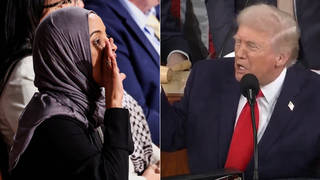
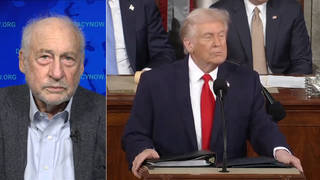

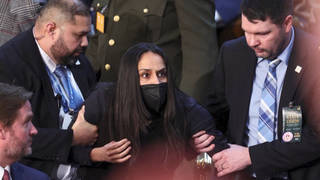





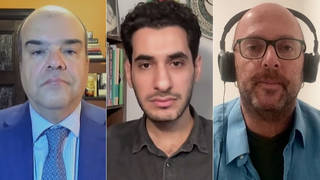
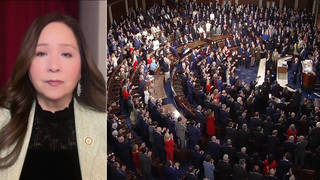
Media Options